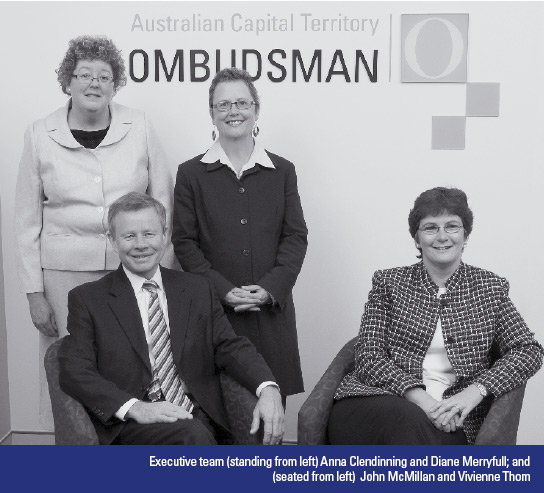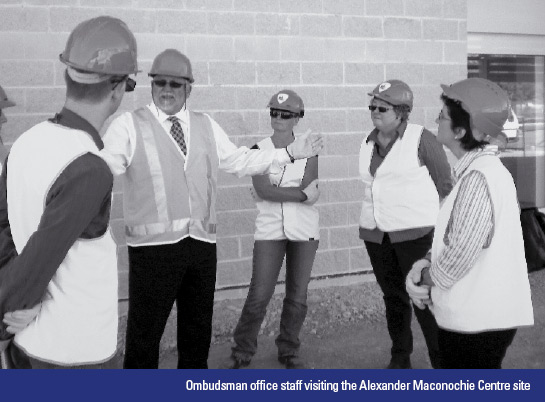Performance and financial management
Performance and financial management
 The ACT Ombudsman's office has been operating for nineteen years. During that time we have assisted in resolving complaints about virtually all aspects of government administration. Complaints arise in matters as diverse as public housing, vehicle registration, child protection, policing and correctional services, and tendering and contracting by ACT Government agencies.
The ACT Ombudsman's office has been operating for nineteen years. During that time we have assisted in resolving complaints about virtually all aspects of government administration. Complaints arise in matters as diverse as public housing, vehicle registration, child protection, policing and correctional services, and tendering and contracting by ACT Government agencies.
The experience and insights gained through dealing with complaints have enabled the ACT Ombudsman's office to stimulate improvements in government administration. We consistently focus on areas such as the quality of decision making, internal complaint handling, transparency, recordkeeping, communication with the public, and sensitivity to individual needs.
By fostering improved government administration, we can strengthen the community's confidence in the integrity and professionalism of government and we can support fairer and more accountable government.
The organisation
The role of the ACT Ombudsman is performed under the Ombudsman Act 1989 (ACT). The Ombudsman also has specific responsibilities under the Freedom of Information Act 1989 (ACT) and the Australian Federal Police Act 1979 (Cth), and is authorised to deal with whistleblower complaints under the Public Interest Disclosure Act 1994 (ACT).
The Commonwealth Ombudsman, who is appointed under the Ombudsman Act 1976 (Cth), discharges the role of ACT Ombudsman under the ACT Self-Government (Consequential Provisions) Act 1988 (Cth).
Up until 30 December 2006 the Ombudsman also had specific responsibilities in relation to the Australian Federal Police (AFP) under the Complaints (Australian Federal Police) Act 1981 (Cth). Complaints made about the AFP before 30 December 2006 continue to be dealt with under that Act. Complaints made after that date are now dealt with under the Ombudsman Act (Cth). Changes to this legislative regime are discussed later in the report. In addition, the Ombudsman has a role in monitoring compliance with Chapter 4 (Child Sex Offenders Register) of the Crimes (Child Sex Offenders) Act 2005 (ACT) by the ACT Chief Police Officer and other people authorised by the Chief Police Officer to have access to the register.
The ACT Ombudsman is an independent statutory officer who considers complaints about the administrative actions of government departments and agencies. The Ombudsman aims to foster good public administration by recommending remedies and changes to agency decisions, policies and procedures. The Ombudsman also makes submissions to government on legislative and policy reform.
The office investigates complaints in accordance with detailed written procedures, including relevant legislation, a service charter and a work practice manual. It carries out complaint investigations impartially, independently and in private. Complaints may be made by telephone, in person or in writing (by letter, email or facsimile, or by using the online complaint form on our website). Anonymous complaints may be accepted.
The key values of the ACT Ombudsman are independence, impartiality, integrity, accessibility, professionalism and teamwork.
Our clients and stakeholders cover all people who may be affected by the administrative actions of ACT Government agencies and the AFP in carrying out their ACT Policing role.
A services agreement between the ACT Government and the Ombudsman covers the provision of services in relation to ACT Government agencies and ACT Policing.
In 2007–08 the Ombudsman delegated day-to-day responsibility for operational matters for the ACT Ombudsman to Senior Assistant Ombudsman Damien Browne, and later Senior Assistant Ombudsman Anna Clendinning, and responsibility for law enforcement, including ACT Policing, to Senior Assistant Ombudsman Vicki Brown, and later Senior Assistant Ombudsman Diane Merryfull. Both Senior Assistant Ombudsmen are supported by a team of specialist staff (the ACT Ombudsman Team and the Law Enforcement Team respectively) in carrying out these responsibilities for the Ombudsman. The Ombudsman and Deputy Ombudsmen maintain an active involvement in the work of these two teams.

Overview
Complaint statistics
Complaint handling continues to be the core of the ACT Ombudsman’s role. In 2007–08 the office received 711 approaches and complaints from the public about ACT Government agencies (541) and ACT Policing (170). This represents a decrease of nearly 25% on the 941 approaches and complaints we received in 2006–07. The figures are not directly comparable because of changes in the way ACT Policing complaints are dealt with, as described later in the report.
The number of approaches and complaints received about ACT Government agencies increased slightly (541 in 2007–08, compared to 528 in 2006–07). ACT Corrective Services and Housing ACT continue to be the agencies about which we receive most complaints.
During the period we finalised 800 approaches and complaints, with 561 being about ACT Government agencies, and 239 about ACT Policing.
Detailed analysis of complaints received and finalised is provided in the ‘Performance’ section of this report under the headings ‘Complaints—ACT Government agencies’ and ‘Complaints—ACT Policing’.
Submissions and major investigations
A distinct role of the Ombudsman is to contribute to public discussion on administrative law and public administration, and to foster good public administration that is accountable, lawful, fair, transparent and responsive.
As part of this role we made submissions to, or commented on, a range of administrative practice matters, cabinet submissions and legislative proposals during the year. This included providing comments on draft amendments to the Ombudsman Act 1989 that were included in the Statute Law Amendment Act 2008.
In August 2007 the Ombudsman released his report on an own motion investigation into delays in decisions on taxation objections in the ACT Revenue Office, ACT Department of Treasury: handling of revenue objections (Report No 1/2007). During the year we conducted an own motion investigation into the adjudication of breaches of discipline at Belconnen Remand Centre and Symonston Temporary Remand Centre. The report of this investigation will be released in early 2008–09.
The results of a joint AFP/Ombudsman review of ACT Policing’s Watchhouse operations were released in June 2007. The joint review team has examined the extent to which the recommendations of the review had been implemented. It is expected that the follow-up of the recommendations will be completed in the first half of 2008–09.
Organisational planning and environment
During the year the office’s strategic plan was reviewed to build on achievements over the past three years and to reflect priorities for the period 2008 to 2011. Strategic priorities identified for 2008–09 are to:
- target outreach, relevant publications and communication activities to key stakeholders, particularly through intermediaries
- be responsive to areas of changing need in allocating resources
- build on the work practice and system changes to deliver improved timeliness, efficiency and effectiveness in managing complaints
- improve quality assurance and consistency in complaint handling
- improve staff training and development programs.
The office’s strategic plan informs its internal business plans. There are clear links between the objectives and the key measures of success of the strategic plan and the goals and directions set in the business plan for all teams and for staff members in their individual performance agreements. As a result, performance agreements are closely linked to business plans.
Highlights
Complaints service
During the year we signed a new services agreement with the ACT Government for the provision of Ombudsman services in relation to ACT Government agencies and ACT Policing. The agreement takes into account complaint workloads for the office and new developments in ACT functions, such as the new ACT prison.
In 2005–06 we introduced a raft of changes to our work practices to improve the consistency, effectiveness and efficiency of complaint handling. These changes were refined during 2006–07 and 2007–08. During 2007–08 we conducted an external post-implementation review of the changes, and convened an internal working party to consider whether complaint work can be managed more efficiently.
These reviews identified some areas for further improvement. In response, we have implemented a number of changes. For example, we have:
- created an Information Management Committee to ensure that the development of information technology, work practices and governance strategies align with a whole-of-office approach to information management
- developed a new, risk-based quality assurance framework.
Our capacity to deal with complaints in an effective and timely manner depends to a significant extent on our relationship and interaction with government agencies. In late 2006–07 we undertook a survey of ACT and Australian Government agencies to ascertain their views about our effectiveness and our interactions, and to identify areas where we could improve processes to lead to speedier and more effective resolution of complaints.
The survey results showed that the role of the office is accepted and well regarded, with most respondents agreeing on the importance of the office and its impartiality. Some specific areas were noted for improvement. We have started a range of initiatives in response, such as working to improve the quality and amount of information we provide to agencies about various aspects of the work of the Ombudsman’s office.
Further details of the reviews, the survey and changes we have implemented will be published in the Commonwealth Ombudsman Annual Report 2007–2008.
Following changes in 2006 to the way complaints about the AFP are handled, the Ombudsman has a responsibility to review the administration of the AFP’s handling of complaints, through inspection of AFP records. The first two reviews of the AFP’s administration of complaint handling, including handling of complaints about ACT Policing, were completed in 2007–08. The Ombudsman will report to the Commonwealth Parliament on the outcome of these reviews in early 2008–09.
Public administration and complaint handling
Our expertise in public administration helps us to ensure that best administrative practice is integral to government planning and decision making. The office continued to provide input on significant ACT Government projects during the year, including on the ACT Prison Project. We also continued to hold regular meetings with agency contact officers to maintain the good working relationships so important to timely and effective resolution of complaints.
During the year, a Senior Assistant Ombudsman, Ms Mary Durkin, was appointed to the position of ACT Health Services Commissioner. We congratulate Mary on this notable achievement.
Outlook for 2008–09
Late in 2007–08 we commissioned an independent market research company to undertake a survey of complainants. The survey aims to obtain information on three key aspects—access, demographics and quality of service. We will analyse the results of the survey and report on the results and initiatives taken in response in 2008–09.
The coming year will see the opening of the Alexander Maconochie Centre and the Bimberi Youth Justice Centre. Consequently it is possible that we will see a change in the nature of complaints arising in relation to these facilities, including from people moving from interstate prisons to the new ACT prison. We will work closely with relevant agencies to identify any systemic issues that may appear to be arising.
We will also use the information arising from our reviews of AFP complaint handling to assist the AFP in improving their complaint-handling processes.
We will continue our program of seminars for ACT Government complaint contact officers, aimed at increasing the practical complaints-handling skills of those officers, as well as enhancing their understanding of the role of policy and legislation in decision making. We are also developing a range of information about the role of the ACT Ombudsman and how the office works, to help staff in agencies as well as the general public.
Analysis of agency performance
Summary against performance
In 2007–08, the ACT Government paid an unaudited total of $952,475.70 (including GST) to the Ombudsman’s office for the provision of Ombudsman services. Moneys were received directly from the ACT Government initially under a memorandum of understanding, and then under a new services agreement from 31 March 2008. Payments (including GST) were for the purposes of the Ombudsman Act 1989 (ACT) ($448,374.30) and for complaint handling in relation to ACT Policing ($504,101.40).
The office’s performance against indicators is shown in Table 1 and provided in more detail under the headings ‘Complaints—ACT Government agencies’ and ‘Complaints—ACT Policing’. The statistical report in Appendix 1 provides details of complaints received and finalised, and remedies provided to complainants in 2007–08.
| Performance indicators | ACT Government agencies | ACT Policing |
|
Number of approaches and complaints received |
541 approaches and complaints (528 in 2006–07) | 170 approaches and complaints |
|
Number of approaches and complaints finalised |
561 approaches and complaints (501 in 2006–07) | 239 complaints and 293 complaint issues |
| Time taken to finalise complaints | 87% of all complaints finalised within three months (89% in 2006–07) | 92% of complaints finalised under the Ombudsman Act (Cth) within three months |
Note: Because of the changes to the legislative regime for ACT Policing complaints, the statistics are not comparable year by year.
Approaches and complaints to the office range from simple contacts that can be resolved without investigation through to the formal use of the Ombudsman’s powers. Where a complaint involves complex or multiple issues, we conduct a more formal investigation. The decision to investigate a matter more formally can be made for a number of reasons:
- the need to gain access to agency records
- the nature of the allegations made by a complainant
- the time taken by an agency to respond to our requests for information
- the likely effect on other people of the issues raised by the complainant.
As well as handling complaints directly, the Ombudsman’s office plays a valuable role in referring people to the most appropriate agencies to deal with their concerns. If a person has an enquiry or complaint outside the Ombudsman’s jurisdiction to deal with, we try to provide relevant information and contact details to assist them.
Training and liaison
The Ombudsman’s office attaches great importance to establishing a cooperative and respectful relationship with government agencies and community sector organisations. This is important in the effective and efficient conduct of our complaint investigation role.
Ombudsman staff participated in a number of formal and informal meetings and training sessions with ACT Government and other agencies. Activities included:
- conducting a forum for ACT Government agency contact officers and complaint handlers
- providing a briefing to Members of the ACT Legislative Assembly, ACT Senators and Members of Parliament, and their staff, on the role and functions of the Ombudsman
- providing a number of information sessions for trainee custodial service officers and probation and parole officers
- continuing to provide input to the Department of Justice and Community Safety on the ACT Prison Project
- participating in the ACT Free Legal Advice Forum and the Complaint Handlers Forum to discuss topical issues in complaint management
- conducting regular meetings with senior staff in ACT Government agencies to provide feedback on complaints received and to ensure complaints are handled smoothly.

Service charter standards
We are committed to providing the best service possible. The ACT Ombudsman Service Charter is available on our website at www.ombudsman.act.gov.au. The charter outlines the service that can be expected from the office, ways to provide feedback and steps that can be taken if standards are not met. We reviewed our service charter standards during the year.
If a complainant disagrees with our conclusions on a complaint, they may ask for the matter to be reviewed. A Deputy Ombudsman will consider the information provided and decide whether or not we will review our decision. The Deputy Ombudsman chairs the office’s internal review panel and allocates the request for review to an officer who has not had prior involvement in the complaint. The review officer will consider whether the processes our staff followed were fair and adequate, and whether the conclusions reached were reasonable and properly explained.
During 2007–08 we dealt with 12 requests for reviews, 11 of which involved ACT Government agencies and one in relation to ACT Policing. The original decision was affirmed in seven complaints. Of the other requests:
- in one case we varied the outcome in that the complaint was in jurisdiction but investigation was not warranted
- in one the outcome was affirmed after further investigation
- one request was withdrawn 1
- one request was refused as the matter was still being investigated
- one request was still under consideration at the end of the reporting period.
